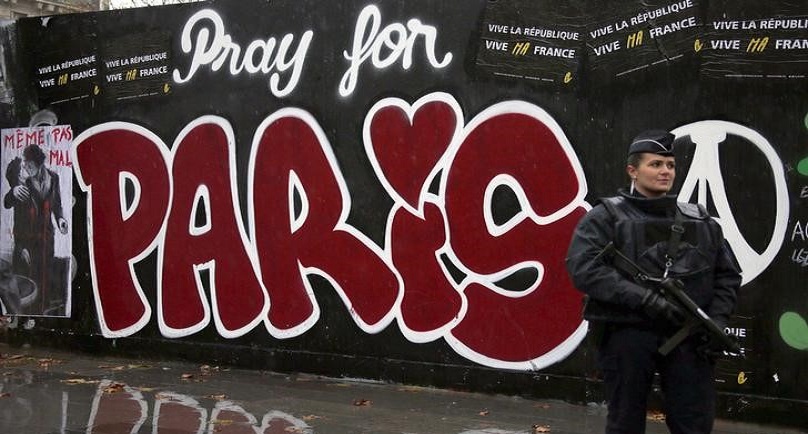Image:A police officer stands guard at Place de la Republique a week after a series of deadly attacks in the French capital, in Paris, France, November 21, 2015. REUTERS/Eric Gaillard
![]()
By Tom Heneghan
PARIS (Reuters) – France calls itself “the homeland of human rights” but has focused in the past week on limiting them as the government pushed through sweeping curbs on basic freedoms in the wake of the Paris massacre.
In the edgy days since jihadists killed 130 people on Nov. 13, the government declared a “war on terrorism”, extended its initial post-attack state of emergency for three months and laid out plans to write further restrictions into the constitution.
Civil libertarians protest that the crackdown could leave fundamental rights curtailed even after the crisis has past.
But their objections have been hard to hear amid calls for tougher laws, details about the attacks and reports of French retaliatory bombing of Islamic State’s Raqqa stronghold in Syria.
The National Assembly, or lower house of parliament, passed the sweeping new security measures on Thursday by an almost unanimous vote of 551 for and only six against. In the Senate the next day, the tally was 336 votes for and none against.
In an Ifop public opinion poll published on Tuesday, 84 percent of those surveyed said they were “ready to accept more controls and a certain limitation of freedoms”.
“The government is giving guarantees of security to a traumatised population that asks for ever more security, even at the price of sacrificing its own freedoms,” said Noel Mamere, one of the few deputies to vote against the new measures.
“In a few months, these same people will wake up with a hangover and realise that, in the name of fighting terrorism, the country has been locked down and our individual and collective liberties violated,” he told Reuters.
Shocked by the attacks and concerned that more may come, the government says it has no time to lose.
President Francois Hollande cited the 1789 Declaration of the Rights of Man and the Citizen – the document that gives France its claim to be the birthplace of human rights – to defend the crackdown in a speech on Monday.
That historic text states “that security and the resistance to oppression are fundamental rights,” he said. “So we should exercise them.”
“Security is the first of all freedoms,” Prime Minister Manuel Valls said in the debate on the new measures on Thursday.
WIDER POWERS
The state of emergency, initially declared for 12 days but now extended to Feb. 14, gives police wide powers to search people and houses if any conspiratorial activity is suspected.
Police have made ample use of this in the past week, raiding 793 premises and arresting 90 people, the Interior Ministry said on Friday. They also seized 174 weapons, illegal drugs and 250,000 euros ($266,100) in cash.
Some 164 people have been put under house arrest, it said.
The new law extends these powers for another three months and gives authorities other powers, such as dissolving any group judged to be a threat to public order. Its wording implies this is aimed at suspected jihadist networks.
It gives authorities wider powers to detain people if their behaviour is considered to be a threat, which is less narrow than the old law that focused only on threatening activities.
Hollande also plans to submit a constitutional amendment early next year including a new power to strip dual nationals of their French citizenship if they join a jihadist group and to restrict French jihadists from returning from abroad.
The influential daily Le Monde was sceptical but not dismissive. “We remain to be convinced,” it wrote in an editorial. “Security is necessary, but not at any price.”
Civil libertarian groups such as the League of Human Rights or Amnesty International concede the initial 12-day state of emergency was necessary, but have strongly criticised its three-month extension and Hollande’s further security plans.
“It is a paradox to suspend human rights in order to defend them,” said John Dalhuisen, Amnesty’s director for Europe and Central Asia.
HOW LONG AN EMERGENCY?
Mamere, a prominent environmentalist, compared the new law to the Patriot Act on enhanced surveillance that the United States quickly passed after the Sept. 11 attacks in 2001.
“The U.S. was the first to enter this unbearable spiral with the Patriot Act,” he said. “We’re following the American scenario.”
Asked why there was so little public debate about this, Mamere said the French – much more than Americans – look to the state to protect and support them. “Here the state is the protector, but it is becoming a threat,” he said.
What he now fears, he added, is that Muslims will be suspected as a “fifth column” and anti-immigrant politicians will use security concerns to turn away migrants now flocking toward Europe, most of whom are Middle Eastern Muslims.
He thought the state of emergency might last longer than the three months that parliament has just approved. “When the government proposes to lift it, there will be people like the police unions and politicians who will ask why.
“It’s meant to address terrorism and everyone knows the terrorist threat will not be gone in three months,” he said.
($1 = 0.9395 euros)
(Reporting by Tom Heneghan)
Copyright 2015 Thomson Reuters. Click for Restrictions.


